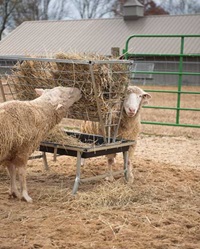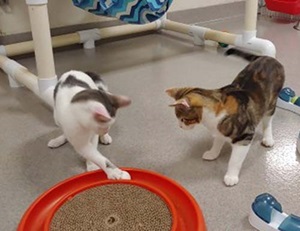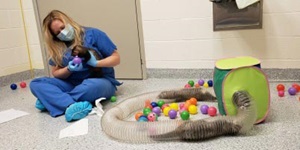Animal Research Outreach at Wake | AROW Advocating for responsible, ethical, and highly regulated animal research
Wake Forest School of Medicine Program for Animal Welfare
Why Animal Research Matters to Everyone
Animal research is vitally important in understanding how a healthy body works and how diseases, illnesses, and injuries affect that body in both humans and other animals. Animal research has made possible virtually all the medications, medical devices, surgeries, treatments, and therapies we need when we are sick or injured.
Animals benefit from this research too. Animal vaccines (to prevent rabies, parvovirus, distemper, and feline leukemia), veterinary drugs (for cancer, heart disease, and infections), advanced surgical procedures and imaging technologies are example of advances in veterinary medicine due to animal research.
In order to study animals, scientists must explain to a regulatory approval committee why alternatives will not work. Alternatives to animals (like cell cultures, computer modeling, and organ-on-a-chip technology) are used whenever possible. But these alternatives cannot duplicate the complexity of a living organism—only animals can give us that. Animal research is only done when it is truly necessary and under humane conditions. Whenever possible, Wake Forest will adopt out healthy, post-study research animals into long term, caring private homes, farms, or sanctuaries.
At Wake Forest, our scientists and veterinarians are committed to responsible and ethical research. A very important part of that commitment is our dedication to providing all research animals with the highest standards of care and respect.
Shared Vision
Researchers throughout the country are working to advance medical discoveries under thorough regulatory oversight, moving science forward while treating animals humanely.
How We Care For Our Animals
Good animal care and good science go hand in hand.
Everyone involved with animals in research has the responsibility to care about the animals’ welfare. At Wake Forest, animals are treated with compassion and respect, with attention given to their daily physical and psychological needs as well as their safety.
|
Technician exercising ferrets |
Veterinarians with specialized training in laboratory animal medicine, along with veterinary technicians, provide medical care for our animals 24 hours a day, 365 days a year. Our animal care staff provides expert husbandry. A team of Environmental Enrichment Specialists provides species-appropriate enrichment (toys, food, etc.) to animals so they can engage in their normal behaviors. |

A dedicated Laboratory Animal Training Coordinator provides hands-on training to research and animal care staff on how to properly handle animals and on various procedures.
The use of animals is highly regulated with numerous national, regional and local laws, regulations, policies, and guidelines set in place. Our animal research program is fully accredited by the Association for Assessment and Accreditation of Laboratory Animal Care International (AAALAC), which upholds the highest standards of welfare for research animals and is the gold standard for programs like ours.

The goal of everyone involved with animal research at WF is to make sure that animals are always treated ethically, humanely and with respect.
Questions about Animal Research Outreach at Wake?
The team is happy to answer your questions. Please reach out today to either Miranda Moore at Miranda.L.Moore@Advocatehealth.org or iacucAHWFB@Advocatehealth.org




